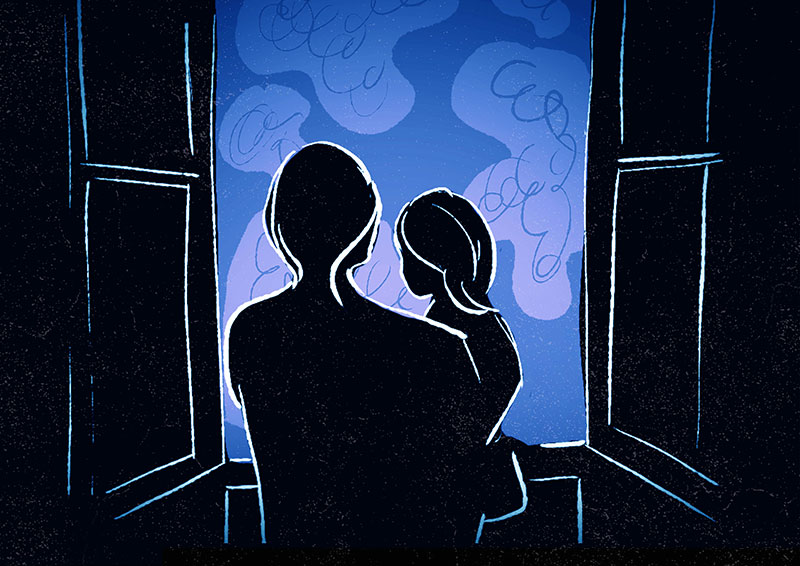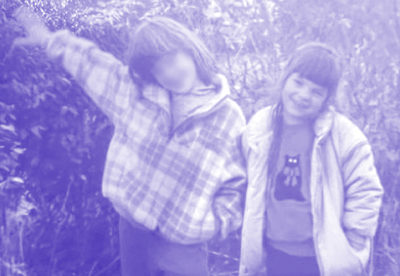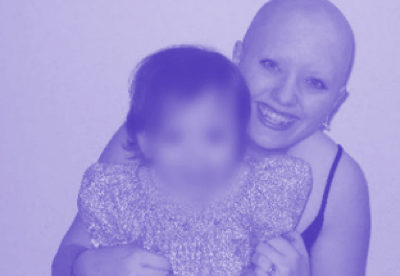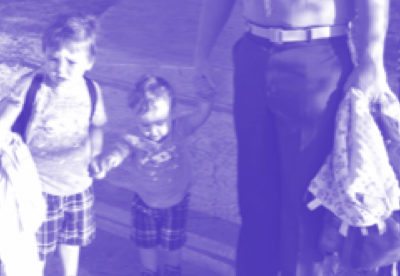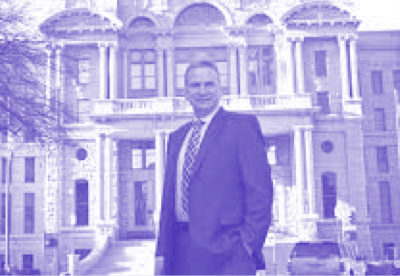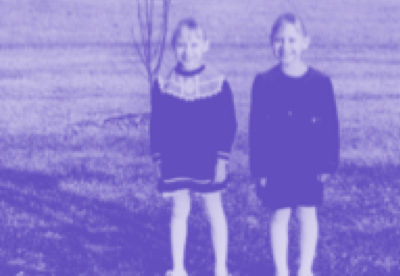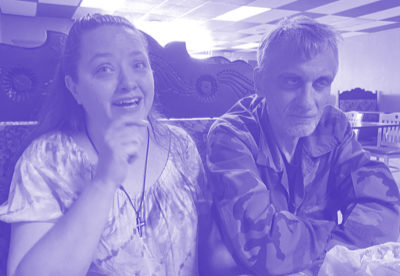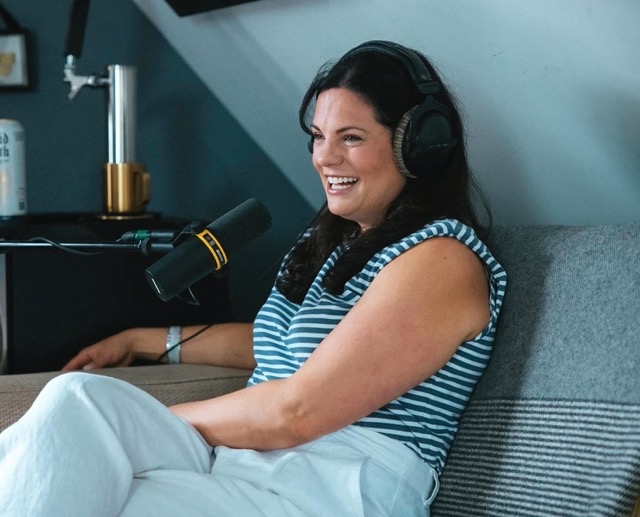SEASON 06 | EPISODE 01
This season on Nobody Should Believe Me, we tell the story of Lisa McDaniel, who crafted a public image as the Director of Patient Advocacy at the Guthy Jackson Foundation while concealing her conviction for child abuse more than a decade ago.
We begin with an introduction to the McDaniel family: Lisa, her husband Carey, and their children—Mishelle, Angellyn, and Collin. While the unraveling of their family began when Collin was “diagnosed” with NMO (Neuromyelitis Optica), to understand the full story, we must go back to where it all began: Hazlehurst, Georgia.
Andrea and our producer Myrriah travel with Mishelle–Lisa’s courageous eldest daughter– to her mother’s hometown, where they sit down with Lisa’s younger sister, Sabrina. Sabrina recounts a childhood marked by emotional manipulation and physical abuse at the hands of her older sister. She walks us through Mishelle’s early years, how, as a baby, she was often left with relatives for days at a time, and then through Lisa’s troubled pregnancy with her second child, Angellyn.
Stay tuned through the end of the episode for a preview of what’s to come this season.
***
This season covers sensitive subject matter involving allegations of child abuse, medical child abuse (also known as Munchausen by proxy), and the death of a minor. All information presented is based on court records, first-person interviews, contemporaneous documentation, and publicly available sources.
The podcast includes personal statements and perspectives from individuals directly involved in or affected by these events. These accounts represent their experiences and interpretations, and some statements reflect opinions that may be emotionally charged. Where appropriate, the reporting team has verified claims through official records or corroborating sources.
Nothing in this podcast should be interpreted as a legal conclusion or diagnosis. All subjects are presumed innocent unless convicted in a court of law. This podcast is intended for informational and public interest purposes.
This podcast contains audio excerpts from two phone conversations recorded in the states of Georgia and Alabama, respectively. Both recordings were obtained by a third-party source, who acted in accordance with the relevant one-party consent laws of those states, which allow for the lawful recording of a conversation with the consent of one participant.
These recordings were subsequently shared with the producers of this podcast after the fact, and were not made by or at the direction of the podcast team or its parent organization.
The podcast producers have made good-faith efforts to confirm the legal compliance of the original recordings, and are presenting these materials in the context of public interest reporting. The inclusion of this audio is intended for journalistic, educational, and documentary purposes in alignment with the principles of fair use and First Amendment protections.
Listeners are advised that the views expressed in the recordings are those of the individuals speaking and do not necessarily reflect the views of the producers or affiliated entities.
Host Andrea Dunlop:
https://www.andreadunlop.net
For behind-the-scenes photos:
https://www.instagram.com/andreadunlop/
Support the show and get exclusive bonus content:
https://patreon.com/NobodyShouldBelieveMe
For information and resources:
https://www.munchausensupport.com
The American Professional Society on the Abuse of Children’s MBP Practice Guidelines can be downloaded here.
More about Dr. Marc Feldman:
https://munchausen.com
Transcript
[00:00:00] Andrea: Well,
[00:00:03] Mishelle: here we are. Here we are. It’s crazy. It’s like this feels so surreal. Where would you like?
[00:00:14] Mishelle: I don’t know. Where do you begin?
[00:00:16] Andrea VO: Meet my friend Michelle. Michelle lives in a small [00:00:20] town in Georgia with her husband where she works as a hairdresser. But despite her baby face and ever changing rainbow hair, Michelle has the kind of wisdom that can come from surviving a series of unimaginable horrors.
[00:00:33] Bea: Why? Why would I be with someone I
[00:00:35] Mishelle: can’t overcome? Because you can. Because Mama, please listen. Please listen. Your husband will [00:00:40] listen to you. Please listen to me.
[00:00:41] Andrea VO: For most of her life, Michelle has been living under the weight of her family’s terrible secrets. A story that only a small group of confidants and licensed professionals have known about.
[00:00:53] Andrea VO: The long and complicated saga of her mother, Lisa McDaniel, is one Michelle and I have been talking about covering [00:01:00] on this podcast for years.
[00:01:02] Bea: Please listen to me. Okay, I will, but here’s what I want to say first. Much hasn’t by proxy is something that even Bjorker says you cannot recover from. And she doesn’t even agree with that
[00:01:10] Mishelle: anymore, Mama.
[00:01:11] Mishelle: She doesn’t even agree with that anymore. She got in
[00:01:13] Bea: my courtroom and said that and it ruined my fucking life. It ruined my damn life. We
[00:01:17] Mishelle: can leave Bjorker out of this. That’s what I’m saying. Y’all didn’t hear me [00:01:20] when I said it the first time, but I’m serious. I have talked. To everybody, and me, Yorker, and I literally told her at one point that I didn’t want to speak to her anymore because I needed distance from her, because I didn’t know how you felt about her, you have talked about her for years, and I tried to understand your point of view going into this whole thing.
[00:01:37] Mishelle: I am here in your living room because [00:01:40] I have empathy for you, and I believe that there is good in you. And I love you, I would not be sitting here right now if I didn’t feel that way.
[00:01:54] Andrea VO: Coming forward wasn’t an easy choice for Michelle. There has been a heavy silence over the horrifying [00:02:00] events that have reverberated throughout generations of her family.
[00:02:03] Andrea VO: But that silence ends today.
[00:02:09] Mishelle: Where do you begin? Um, jeez.
[00:02:13] Andrea VO: This season on Nobody Should Believe Me, we’re covering the complicated story of Lisa McDaniel, her husband, [00:02:20] Kerry, and their three children, Michelle, Angeline, and Colin, and attempting to unravel what happened, whether this is a story of a medical mystery or a different sort of mystery altogether.
Intro
[00:02:32] Andrea VO: People believe their eyes. That’s something that is so central to this topic, because we do believe the people that we love when they’re [00:02:40] telling us something. If we didn’t, you could never make it through your day. I’m Andrea Dunlop, and this is Nobody Should Believe Me.[00:03:00]
Ad Break
Act 1
[00:03:07] Mishelle: It’s like, so how are you feeling? And I’m like, I’m so nervous.
[00:03:15] Andrea VO: Michelle and I first met when we were part of the pilot support group for Munchausen Support, [00:03:20] the non profit organization that I founded in 2021. These days, my mentor Bea Yorker, a professor emerita and long time psychiatric nurse, is the sitting president. I still serve on the board, and Michelle is getting involved in the work as well.
[00:03:34] Andrea VO: Bea has been devoted to this cause for decades, and she’s the one who brought Michelle and I together. [00:03:40] Michelle and Bea reconnected many years after the events that first brought Bea into the McDaniels lives.
[00:03:47] Mishelle: You and I talked a little bit about things when I first contacted you. Um, and that was like, what, 2019, I believe, after we found the records.
[00:03:58] Bea: I believe that’s how I [00:04:00] first met you. even learned that your sister was still alive, that you were okay. Um, and I gave the nurse, the NICU nurse, my email information and I said I would love to hear from both of the girls. [00:04:20]
[00:04:20] Andrea VO: What do you hope for with Michelle coming forward with her story? Publicly, really for the first time, what do you hope that that can accomplish?
[00:04:29] Bea: What I hope is that when the general public and when child abuse professionals hear from somebody’s lived experience, that it [00:04:40] is so much more impactful than reading data in a book. So I want you to be able to share your emotional reactions to your journey of coming to this place. We’re now. You know, you’re, oh my gosh, you’re just [00:05:00] blossoming and you’re resilient and you’re amazing and um, it’s not because you had a safe childhood.
[00:05:09] Bea: You proud of Michelle? Oh my gosh, I’m so proud, so proud.
[00:05:18] Andrea VO: Most of what can readily be [00:05:20] found online about Michelle’s mom and the woman at the center of this season, Lisa McDaniel, relates to her work as the Director of Patient Advocacy for a non profit called the Guthy Jackson Foundation. I encourage
[00:05:37] Lisa: you, [00:05:40] physician, use your family and friends who may work at medical offices. Ask for referrals, get out there, knock on doors, and don’t give up until you get someone who will let you in their office to tell them more about NMO. You do not have to be a public speaker. You just have to be able to talk to your doctor, talk to their staff, and just share your [00:06:00] story.
[00:06:00] Lisa: Because as Christine just told you, she has a story, but guess what? Each one of us in this room have our own story.
[00:06:09] Andrea VO: That’s Lisa McDaniel presenting at the Guthy Jackson Foundation’s NMO patient day. NMO, or neuromyelitis optica, is a rare autoimmune disease. Lisa [00:06:20] is 53 with a youthful round face. and the red hair that she passed along to her three children.
[00:06:25] Andrea VO: You’d never know from her carefully crafted public image that Lisa has done jail time for child abuse. Rather, her image centers on her advocacy around NMO and her work at the foundation. Work which, as it says in [00:06:40] her bio, was informed by her own experiences as a caregiver for her son.
[00:06:45] Lisa: My son Colin was five years old when he had his first symptom of vision loss in 2007.
[00:06:50] Lisa: We’re gonna go in here and get Some of the stuff we talked about done, okay? Remember, they’re going to take pictures and see how the blood works in your body. Okay?
Colin’s always been healthy, [00:07:00] never had problems. He just lost his vision completely in about two days. We ended up coming to Birmingham, Alabama to the Center for Pediatric Onset Demyelinating Diseases and saw Dr.
[00:07:12] Lisa: Jane Ness there. She told us neuromyelitis optica and we had never heard of it. She explained to [00:07:20] us that it was It used to be thought it was a severe form of multiple sclerosis that It’s a very difficult disease and proceeded to tell us that there could be times where Colin could be paralyzed in the future, he could lose his vision again, and just, just varying degrees of disability that he could have.[00:07:40]
[00:07:40] Andrea VO: This video begins with a shot of Lisa and her husband, Kerry, walking their son, Colin, down a hospital hallway in a wheelchair. Then cuts to a professionally shot interview of Lisa in a leopard print blazer and a statement necklace. Dr. Ness wants to talk to you, babe.
[00:07:54] Dr Ness: I gotta do a couple of things. I’m gonna do it as quick as I can, but I gotta look in your eyes, okay?
[00:07:58] Dr Ness: I know you feel awful. [00:08:00] What we’re gonna do is Hold my hand. I know you hate it. We’re gonna do it as quick as we can.
[00:08:06] Andrea VO: The other voice you hear in this clip is Dr. Jane Ness, the pediatric neurologist who diagnosed Lisa’s son, Colin, with NMO. The picture Lisa presents online is of a gentle, soft spoken Southern mom whose mighty struggles as [00:08:20] the mother of a sick child led to her career as a dedicated advocate for other families.
[00:08:25] Andrea VO: But nothing about Lisa is what it seems. Lisa McDaniel has worked very hard to bury her past. But that’s the thing about the truth. You can spin it. You can push it down, but it has a way of catching up to you. A life [00:08:40] built on lies just isn’t very durable, because sooner or later, someone might come along and put all the pieces together.
[00:08:50] Mishelle: I don’t know how this is going to land. And I hope, I know you’re probably not going to understand it. I’ve been in some support groups for [00:09:00] probably two or three years. Uh. And a really close friend of mine runs a podcast and she asked me to go on her podcast and kind of talk about everything that we grew up with and I agreed to do it.
[00:09:18] Mishelle: Um, [00:09:20] I hope that it will be an opportunity to kind of air some things out and heal from a lot of things that I still don’t have answers to. Um, I know there’s been some things and it’s not all old stuff for me, but I just wanted to let you know [00:09:40] before any of it came out or happened, um, because I do love you and I do have respect for you and I didn’t want it to just be out there and you find it.
[00:09:52] Mishelle: Somewhere
[00:09:54] Lisa: and have that. So did you give any considerations of what this is gonna do to angel’s life, to your daddy’s life? To my life.
[00:09:59] Andrea VO: This is Michelle [00:10:00] talking with her mother Lisa. I
[00:10:01] Lisa: have a thousand percent I have. ’cause you could literally be taken away our incoming, you could literally be ruining everything that, that I’ve tried to overcome and work hard.
[00:10:11] Lisa: You can literally take our whole entire life away. You not understand.
[00:10:14] Mishelle: Well, I’m not here to hurt you. Feels that way. I don’t
[00:10:18] Lisa: know why. [00:10:20] Because you’ve always been very rebellious your whole entire life. Mama. All I’m
[00:10:28] Mishelle: asking is some accountability. Nobody is irredeemable. I
[00:10:33] Lisa: mean, what do you want, access to all my medical records?
[00:10:35] Lisa: No, I don’t, I don’t,
[00:10:36] Mishelle: I don’t know, Mama, but I don’t [00:10:40] believe you and I don’t trust you. And if you’re, and, and It doesn’t
[00:10:42] Lisa: matter what I say, Mama.
[00:10:44] Mishelle: I’ve been gaslit my whole life. By anybody and everybody. Things still don’t make sense to me.
[00:10:52] Lisa: They’re never going to, Ms.
[00:10:54] Mishelle: Clark. Don’t, because you have lied to us.
[00:10:56] Lisa: Yeah, I have. I told you that. You lied to me, he’s lied to us, she’s lied to us. You’re right. [00:11:00] I have lied to
[00:11:01] Mishelle: you, but I have not lied to you to that point, and that is not the same thing. Lying is a lie. I understand a lie is a lie, but a lie is very different when you are causing yourself direct harm, or causing the children in your life direct harm.
[00:11:14] Lisa: I did. I exaggerated it. Does that mean it’s Sponge House and by proxy? Maybe it does, maybe it doesn’t, but here’s the thing. Why [00:11:20] label me with something? Why? Why do I have to deal with something I can’t overcome?
[00:11:23] Mishelle: Because you can. Because Mama, please listen, please listen. You’re asking me to listen to you, please listen to me.
[00:11:29] Andrea VO: The story we’re covering this season gets at many of the core questions of this show. How do you cope with the truth when the truth is unfathomable? Can [00:11:40] dragging long hidden horrors into the light help us heal? Bring us peace? Even maybe reconcile with those who’ve harmed us? Or are there things that, even for the most compassionate among us, simply can’t be forgiven?[00:12:00]
Ad Brea
Act 2
[00:12:01] Andrea VO: We tend to think of the past as fixed, immutable, but the reality is more complex. Our history with our own parents older and reach new milestones. As we become ages, we actually remember them being. And particularly if we become parents ourselves, [00:12:20] everything about our family of origin suddenly appears in a new light.
[00:12:24] Andrea VO: I’ve learned this is an especially dramatic process for people like Michelle, whose childhoods were traumatic, whose memories buried themselves out of self protection. As Michelle has found hard earned Stability and safety in her adult life. Disturbing [00:12:40] memories have begun to reemerge. She has questions about what happened to her and her siblings and leaving them unanswered has become unbearable.
[00:12:49] Andrea VO: So we got to work looking for the truth in the small rural town where we lay our scene, Hazelhurst, Georgia. That
[00:12:59] Mishelle: was [00:13:00] okay. What is a huddle?
[00:13:01] Andrea VO: We do not have house. We do not have huddle house in the north. No. I’ve heard a lot about Hazelhurst, the town where generations of McDaniel’s were born and raised. It’s a sleepy rural town, three hours outside Atlanta. Now it was time to see it for myself.
[00:13:15] Mishelle: Do you know what a waffle house is?
[00:13:17] Mishelle: Uh, I just learned, I mean, I [00:13:20] know what a like a waffle had. You’ve never been to a huddle. I have to really explain.
[00:13:26] Andrea VO: That is my producer Mariah, who was also raised in the South, and Michelle, enjoying me being a fish out of water, as we chatted in a hotel room in the quaint little college town of Valdosta where Michelle now lives.
[00:13:39] Andrea VO: I [00:13:40] also discovered the uniquely Southern miracle that is Bucky’s on this trip, so it was quite the cultural exchange. Wow. And then I was trying to sing her the Jonas Brothers song and she was like, I don’t know what you’re talking
[00:13:51] Mishelle: about. It’s a waffle house. Yeah. We’re gonna work it out. Yeah. I was like,
[00:13:55] Andrea VO: no.
[00:13:55] Andrea VO: She’s like, I know. She’s like, I don’t listen to the Jonas Brothers. And I was like, I don’t listen to the Jonas Brothers either. But it’s [00:14:00] just optimistic. It’s everywhere. So a huddle house is like. It’s just like a. A huddle house is a waffle house. Okay, well, here’s the thing. Don’t say that
[00:14:07] Mishelle: in the South because you’ll get in trouble.
[00:14:08] Mishelle: But I personally believe that a huddle house is just a better waffle house. However, that is probably the most controversial thing I will say on this podcast.[00:14:20]
[00:14:20] Andrea: Okay. Okay, so you’re talking
[00:14:22] Andrea VO: about
[00:14:22] Mishelle: the
[00:14:23] Andrea VO: hometown?
[00:14:24] Mishelle: Yeah. Walmart. Walmart.
[00:14:26] Mishelle: Walmart and a huddle house. Which is, I mean, that’s where we hung out. Like, as teenagers, we hung out in the Walmart parking lot or at the huddle house at 2am. That was, that’s what we did. Um, and we had, that’s why we had babies so young.
[00:14:39] Mishelle: Because [00:14:40] there was nothing to
[00:14:41] Mishelle: do. Yeah, there was
[00:14:42] Mishelle: nothing
[00:14:43] Mishelle: else to
[00:14:44] Mishelle: do. Like, um, the cops would get mad and run us off from Walmart, and then where else are you going to go? You went home and had babies. So.
[00:14:54] Mishelle: Um I don’t know, I don’t remember where I was going with that.[00:15:00] [00:15:20]
[00:15:20] Andrea VO: Many of them bent at tortured angles following the devastation of Hurricane Helene. Yeah, I feel like there is, there is like a, I think there’s gonna be, Hazelhurst, Georgia is known for.
[00:15:35] Mishelle: Well, there was a murder, and then we had an American
[00:15:37] Mishelle: Idol star, and[00:15:40]
[00:15:43] Mishelle: that wraps it
[00:15:45] Andrea VO: up. Remote as it is, I’m not the first true crime podcaster to come through Hazelhurst. In 2021, Foxhunter covered the murder of Rhonda Sue Coleman, a girl in Lisa McDaniel’s high school class who was killed just after they [00:16:00] graduated. Michelle is also one degree away from another famous Hazelhurst native, Will Moseley, the 2024 American Idol runner up, who is her husband’s brother.
[00:16:10] Andrea VO: They don’t have any known connection, however, to the woman who is perhaps Hazelhurst’s most famous resident, the truly iconic Angela from 90 Day [00:16:20] Fiancé.
[00:16:20] 90 day fiance: Angela! Angela, sit. Angela, chill down and respect us, please. I’m his f ing elder.
[00:16:27] Andrea VO: He’s an idiot. You think it’s f ing funny, Michael? As we make our way into town, Michelle points out landmarks from her past.
[00:16:34] Andrea VO: The turnoff to her granny’s house, her mother in law’s home, and the church where her parents got [00:16:40] married. Then, we finally arrive at the pizza joint where we’re meeting Michelle’s aunt Sabrina, her mother Lisa’s younger sister.
[00:16:49] Mishelle: Hello. Listen, this one’s not on me and I don’t know why you’re surprised I’m late to everything but like.
[00:16:55] Andrea VO: And we’re only a few minutes late.[00:17:00]
[00:17:08] Andrea VO: In my defense, part of the reason we were late was because our hotel had coffee, but not breakfast. And then the breakfast place had food, but no coffee. And this conversation with Sabrina was going to be [00:17:20] intense. Between that and my jet lag, tea was not going to cut it.
[00:17:25] Andrea: So, Sabrina, did you, you’re born, raised, lived all your life in Hazlehurst, or?
[00:17:29] Andrea: Yes.
[00:17:30] Andrea VO: Yes. Okay. At 47, Sabrina is a few years older than me, and we have daughters the same age. I never know exactly how someone’s going to feel about me coming [00:17:40] around asking them to relive their worst traumas. But Sabrina puts us all immediately at ease with her funny, acerbic charm as we settle into one of the only restaurants in town, a dimly lit pizza joint with dark wood paneling and narrow booths.
[00:17:55] Andrea VO: We post up in the empty party room. Likely more used to hosting end of [00:18:00] the year sports banquets than nosy Northerners with podcasts. Sabrina explains how she and her sister Lisa grew up. That’s
[00:18:12] Sabrina: loaded. Um, it is quiet [00:18:20] country until something happens and then everybody knows, everybody knows it. And because everybody knows everybody, it’s kind of like everybody tries to know your business. So if something major ever happens, it’s not, it’s talked about for decades and decades and decades. So [00:18:40] people do not forget it until something new happens and then they’ll talk about that and bring up.
[00:18:44] Sabrina: You know that so
[00:18:45] Mishelle: and so that did so and so back in 1997.
[00:18:49] Sabrina: Yeah, and it’s always like, um, well you know that person is related to that, you know, you always have that kind of relation. And I’ve [00:19:00] always said, Man, if I can ever move. And then, cause you go other, like Savannah or Atlanta or somewhere, and nobody cares who your mama is, nobody cares who your grandma is or your grandpa, or whatever.
[00:19:14] Sabrina: They’re just like, oh, where are you from, you know? So it’s just, it’s different because it’s, everybody [00:19:20] knows everybody, so. Which is a good thing sometimes. But then. People try to get in your business too much. That’s right. Nobody has anything else to do. Yeah, it’s like there’s nothing else to do. Which is the downfall because there’s really nothing to do.
[00:19:38] Sabrina: So, there’s, we don’t have a [00:19:40] theater. We used to have a theater and a skating rink. We don’t have either one of those anymore. So, it’s for kid, kid wise and stuff like that. It’s quiet but nothing to do other than go to school and do like the school activities. Stuff like that. So
[00:19:53] Mishelle: I told him yesterday.
[00:19:54] Mishelle: That’s why we all have babies so young because there’s nothing else to
[00:19:59] Sabrina: do.
[00:19:59] Mishelle: [00:20:00] I’ve never
[00:20:00] Sabrina: really thought about it that way, but okay. I mean that probably is a legit
[00:20:07] Mishelle: reason. Andrea didn’t even know what a, what a huddle house or waffle house was until this trip. You said what now? She didn’t know what a huddle house or a waffle house was.
[00:20:17] Andrea VO: I’m going to get emails about Waffle House for the [00:20:20] rest of my life, aren’t I? Hazelhurst only has about 4, 000 residents, so it’s no surprise that everyone is up in each other’s business. Timber is the main industry, and families and communities are tight knit out of necessity. It’s
[00:20:39] Sabrina: weird because [00:20:40] as you get older, like as I’ve gotten older and grown and had my own kids, I realize that a lot of things Especially my mom would do was not normal, but you think it’s normal because that’s what you grow it at him. But like my dad, he always, [00:21:00] he worked, it was called cooking company over in Lumber City.
[00:21:03] Sabrina: And he worked there until it closed. Um, so my dad, when I was younger, he worked what they called the swing shift. So he would work days and nights. Um, so. He just expected you to behave, do what you were told, and [00:21:20] you just really didn’t have any problems at that. My mama, everybody thought my mama was great.
[00:21:27] Sabrina: Let me just say that, like, my friends thought she was fabulous, everybody thought my mama was fabulous. But my mama would be like, if you don’t do this, you don’t love me. And [00:21:40] y’all just don’t love me the way, y’all, y’all, you love your daddy, but you don’t love me because you don’t treat me the same as you treat your daddy.
[00:21:49] Sabrina: If y’all loved me, y’all wouldn’t do that. It would be nothing other than. We wouldn’t have all the clothes washed, or we wouldn’t do the dishes immediately, typical kid things. [00:22:00] We all just don’t love things. And, like, then, when you’re growing up, you think, okay, that’s just normal. Everybody kind of deals with that.
[00:22:09] Sabrina: But then when you get older, you realize that’s not normal. But like I said, all my friends loved her growing up. They thought, oh, your mama is great. But my [00:22:20] mama, I always said my mama had a switch. It was like she was one person when she was around you, and she flipped a switch when your friends were around.
[00:22:28] Andrea: Do you think maybe that set up kind of a dynamic where you felt like you had to take care of your mom’s feelings? Yes,
[00:22:35] Sabrina: yes, it definitely was a, oh let’s tread lightly, let’s not do [00:22:40] anything to upset her because that just made the days even worse. But it was, um, it was a delicate balance because, looking at it now, I see a lot of, Lisa’s personality was the same as my mom’s.
[00:22:58] Sabrina: Um, but [00:23:00] then it was always a delicate balance. You had to dance around mom and her feelings, but you had to tiptoe around Lisa too, because Lisa always had a keen way. She could manipulate my mama, just, you know, she could, and she would have my mama convinced that something she did, that I [00:23:20] did, or my little sister did.
[00:23:22] Sabrina: And so when my daddy came home, it was like, well, what did you do that for? And I’m like, but I didn’t. I didn’t do it at all. You know, she would, it was just, you always had to just tread the water, tread the water, tread the water.[00:23:40]
Ad Break
Act 3
[00:23:44] Andrea VO: Spending this time with Michelle’s aunt Sabrina was only my second opportunity to get to speak to someone who’d grown up with a perpetrator. The first being my conversations with Hope Ybarra’s siblings way back in season one. The sisters history is lengthy and dark, and though they’re not fully [00:24:00] estranged, their relationship seems unlikely to survive Sabrina’s decision to be with me today.
[00:24:05] Andrea VO: Because Lisa’s child abuse conviction more than 20 years ago That’s just the beginning of this story.
[00:24:11] Andrea: And did you have any, like, health issues?
[00:24:15] Sabrina: Who?
[00:24:16] Sabrina: Lisa. No. Well, when she got to be a, [00:24:20] like, maybe 14 or 15, and maybe it was 16, um, she went through the trying to make herself throw up stage. And my daddy got, really got upset and got aggravated with her.
[00:24:35] Sabrina: And kind of got in her face about it, and so she kind of quit doing it. [00:24:40] So, I think it was more of a, I’m just going to do it to see the attention I can get off of it, because she loved some attention.
[00:24:48] Andrea: Can you think of sort of some other examples of stuff that really struck you as like, her trying to get attention?
[00:24:56] Sabrina: She did a lot. She would just do random things. [00:25:00] We were at one of my dad’s friends house. Their phone rang and it was Lisa. And she’s like, somebody threw a brick through, um, the window. And daddy’s like, well let me go, y’all stay here, let me go see, you know, what’s going on. He’s like, call the police, you know.[00:25:20]
[00:25:20] Sabrina: And when he got there and, yeah, there was a big hole in the future window, um, where she had threw a brick through it and tried to throw a brick through the window next to it, um, and she will never say it with her, but it was her. I mean, she just, because they found no [00:25:40] evidence of anybody else being in the yard, no other shoe prints, no, no, no anything like that.
[00:25:49] Sabrina: She would do stuff like that all the time. Anything to call and say, Oh, I need help. I need help.
[00:25:55] Andrea VO: So even if Lisa didn’t have the health history in her youth that we often see with perpetrators, [00:26:00] there’s always this common theme of deception and finding, or creating, opportunities to be a victim. One of the perpetually confusing things for me about looking back at my own childhood with my sister Megan, whose case I’ve covered in depth on this show previously, is that even though I do see signs of trouble looking in the rear view, [00:26:20] my experience of our childhood together was mostly good.
[00:26:23] Andrea VO: But for Sabrina and Lisa, not so much.
[00:26:27] Sabrina: And see that, that’s the thing. People assume that what happened, what she did to Angeline was like the first sign, but there were so many [00:26:40] signs when we were growing up. My dad had this butcher knife, it was probably 10 inches long with a 3 or 4 inch handle. She would get it and chase us.
[00:26:50] Andrea VO: And you’re her, you’re the youngest of three sisters? I’m the middle.
[00:26:53] Sabrina: I’m the middle of three. Right, okay. So, like I said, that butcher knife, she would take it, especially my little [00:27:00] sister. She would do it more to my little sister, but she would, for no reason, she would just randomly grab it when my parents were gone and just chase.
[00:27:07] Sabrina: And then, you know, those old cast iron frying pans, she would get them and chase you around the house. And she would just do all kind of like mean stuff like that, but it was never her fault. It was [00:27:20] never, well, I just did it because I was mean, because she was, it’s, well, they did X, Y, or Z, and that’s why I did it.
[00:27:29] Sabrina: I think we were excited to get rid of her.
[00:27:31] Andrea VO: Just to interject, by get rid of her, Sabrina is talking about when Lisa disappeared into her relationship with her then boyfriend, now husband, [00:27:40] Kerry. Nothing more sinister than that.
[00:27:43] Sabrina: I mean, but, but, but then you have to understand she was just so mean to us. I mean, she did.
[00:27:49] Sabrina: It was never her fault. It was always somebody else’s fault. You said something to her out of the way, or you looked at her funny, or I mean, it was just random stuff, like [00:28:00] little things that shouldn’t trigger being chased by a butcher knife or a cast iron frying pan, um, that she would do. And then as she got older and started dating Carrie, that was when, you know, everybody wore class rings, like their boyfriends class rings.
[00:28:18] Sabrina: And she would take it [00:28:20] and turn it around and she would hit my little sister, especially, outside the head with it, and just, she just always, she wanted attention.
[00:28:30] Andrea VO: It becomes clear as we dig into Lisa’s backstory with Sabrina, that chaos and drama have been a constant theme. And Lisa’s relationship with Michelle’s father, [00:28:40] Carrie, was no exception.
[00:28:41] Sabrina: When she started dating Carrie, she told my mom and dad that Carrie was four years older than she was. And Carrie was, um, was almost 11 years older than she is. So
[00:28:58] Dr Ness: he
[00:28:59] Sabrina: [00:29:00] was closer to like my dad and mom’s age category than I see, because it was, you know, if
[00:29:07] Mishelle: you look at, so I did the math one time and he was closer to Nana’s age by like, I think four or five months.
[00:29:16] Sabrina: Yeah. Yeah. So that was the first lie. That’s how it started. [00:29:20]
[00:29:20] Andrea VO: The fact that this relationship began with a lie is fitting for reasons that will become clear as we go. Today this relationship would be a crime, but at the time in Georgia, the age of consent was 15. Yikes.
[00:29:35] Sabrina: I mean, it just, it just. It was one, one lie after another lie, after another lie, after another [00:29:40] lie, and then you just get, my mom and dad just got to the point that they just didn’t believe anything.
[00:29:44] Sabrina: By the time she got married, she had caused so much chaos and drama with her relationship with Carrie, that you were just, you just,
[00:29:58] Andrea VO: Once Lisa was out of high [00:30:00] school and married to Carrie, it wasn’t long before they got busy doing what the rest of Lisa’s peers were doing, making babies.
[00:30:09] Andrea: They got married.
[00:30:13] Andrea: She gets pregnant with,
[00:30:15] Sabrina: yeah, but I was excited. She was having Michelle, you know, and you know, [00:30:20] everything was good for a little while. I don’t know if you remember, but
[00:30:24] Mishelle: I remember when I was born,
[00:30:25] Sabrina: I mean, you were born. Um, and you were just a few months old. She started getting left with like at our house all the time.
[00:30:36] Sabrina: So Like I did? Yeah, you did. Yeah, but even before that they,[00:30:40]
[00:30:43] Sabrina: WM, which is Carrie’s dad, had money and they were spending it left, right, and sideways. So they were kind of always going. When she got pregnant with Michelle, that brought her a lot of attention, you know. And so, she was good to stay at home for a little while because, you know, [00:31:00] it got her so much attention, you know.
[00:31:02] Sabrina: Um, and then when Michelle got a few months old, it was like, okay, the attention kind of faded away. So, it was like, okay. And of course, you know, she’s a baby. Everybody wants to keep a baby. Um, yes, we like you because you’re a baby and a kid.
[00:31:16] Andrea VO: There is always a pattern of troubling behavior that [00:31:20] precedes Munchausen by proxy abuse.
[00:31:22] Andrea VO: And that’s why these narratives from family members are so crucial. They were there for all of the foreshadowing. But there is the question of why and how pregnancy and motherhood kicks this into high gear. My kids are six and two, so I’ve been through this period of my life pretty recently. [00:31:40] In the best case scenario, pregnancy and having a brand new baby aren’t crisis situations in and of themselves, but they command a similar sort of all hands on deck attention, especially on your first one.
[00:31:52] Andrea VO: People send food and gifts and go out of their way to come and meet and hold your precious little potato. [00:32:00] So it’s easy to see why this could kick attention seeking behaviors into high gear. And after this period of attention ended, Lisa didn’t seem to have much attachment to or interest in little baby Michelle.
[00:32:12] Sabrina: She was at our house that night. She called me mama before she called her mama mama. Is that
[00:32:16] Mishelle: real? Are you making that up?
[00:32:18] Sabrina: I’m dead serious. [00:32:20] I’m dead serious. You started saying mama one day at Mama, well, I wasn’t married then. I was still in my home, and it was my, she was calling me mama, and I’m like hey, I love you, but I’m not your mama.
[00:32:33] Sabrina: Yeah, I’m a teenager, so I’m like, I love you, but I’m not your mama. Yeah, most of the time when we [00:32:40] got her, like they would drop her off on the weekend, I guess, like when he would be off. And she would stay three or four days and they would come get her and then the week when the weekend comes, she’d stay three or four days and they’d come back.
[00:32:53] Sabrina: I don’t know. Lisa really never worked.
[00:32:58] Andrea: How was Lisa as [00:33:00] a mom in that time period?
[00:33:03] Sabrina: Well, it’s kind of hard to say because When she, when Michelle was first born and was a baby, she seemed to be attentive and everything, but then she started, you know, leaving her at everybody else’s house. So, I would say, you know, part time mom, [00:33:20] maybe?
[00:33:20] Sabrina: I mean, for lack of better, because it was just hard to get that feel, because she was always at our house, or at Debbie and Bernice’s house. So she was never really around parenting her. I mean, like I say, it’s hard, it’s hard to kind of gauge what kind of parent she was, because she always left her. And then I got pregnant with [00:33:40] my oldest one, and she was born in 96.
[00:33:43] Sabrina: Um, she was born in October of 96, but when I got pregnant with her, of course, you know, you get a lot of attention when you, you know, announce you’re pregnant and everything. And you could just tell in Lisa’s face and how she acted that [00:34:00] she could not stand it. She absolutely hated it. She could not stand it.
[00:34:05] Sabrina: And just how dare you take any spotlight away from her. Which, of course, was not my intent. Then the next thing we know, she was pregnant with Angela. Fabulous! You know, I was happy for her. Who wouldn’t, you know, be happy [00:34:20] for somebody, you know, having a child if that’s what they want to do. My oldest was born in October, and then right after that, it was one thing after another, after another.
[00:34:32] Sabrina: I fell down the doorsteps. I need to go to the ER. I fell down the doorsteps again. I’ve had, I’ve called the [00:34:40] ambulance. Just all kind of little things like that. The reality is she never fell down the doorstep. She threw herself down the doorsteps one time. And the reason why I think she threw herself down the doorsteps is because the way they said she landed right with the edge of the doorstep right [00:35:00] directly in her stomach.
[00:35:02] Sabrina: Anyway, that triggered the whole series of events with Angeline coming early. She got pregnant on purpose as a way to get attention for herself, but I don’t know. that she ever really [00:35:20] planned on actually the baby surviving, if that makes sense
[00:35:25] Andrea VO: what I’m saying. This insinuation that Lisa got pregnant with Michelle’s little sister Angeline and then interfered with that pregnancy to draw attention to herself might sound shocking, but to me it’s all too familiar.
[00:35:38] Andrea VO: Fake pregnancies followed by [00:35:40] fake dramatic miscarriages along with real pregnancies followed by induced obstetrical complications and premature births are absolutely textbook in these cases. The timing of my older sister’s pregnancy hoax is a good example of this. It came right in the middle of a falling out with my parents after she had committed check fraud.
[00:35:59] Andrea VO: Which, for the [00:36:00] record, they did bail her out of. And it also came right on the heels of her boyfriend breaking up with her after discovering she’d been abusive with his son. Most people would never use it. But a pregnancy can be a pretty powerful trump card. And Lisa was a master at dragging people into her warped version of reality.[00:36:20]
[00:36:22] Sabrina: When you get so good at telling a lie She has an uncanny ability to make people believe, well, not us anymore, but she can make people believe just about anything she wanted to, about anybody, [00:36:40] and I’m, you know, it’s, how do you get that dark? Like, how do you, I don’t, I don’t understand how people cannot see the true color she is.
[00:36:54] Sabrina: It’s a never ending cycle. It’s one thing, it’s one thing after another after another, and I don’t, [00:37:00] I hardly ever communicate with her because it’s just every time you do, you’re just waiting on that knife to get twisted a little bit further and a little bit further. And, you know, you get to the point where it’s like, look, I forgave you.
[00:37:13] Sabrina: I have never told her I forgive her. I forgive her for my peace, not for hers. I forgave her for me, for my inner peace, [00:37:20] but it’s just constant. And that’s the reason why I don’t have a lot to do with her. Because every time you talk to her, it opens a gate for her to twist it. And in my adult life, I don’t have room for that.
[00:37:35] Sabrina: And I don’t want my kids to learn that. I don’t want my kids to have to deal with that and think that that’s [00:37:40] acceptable because that’s somebody who’s related to you. But that doesn’t mean you have to accept how they act or what they do. She’s my sister. Do I love her? Yes. But I love her from a distance because I don’t have to accept her in my life.
[00:37:53] Andrea VO: Making a show like this, you have to watch out for people who want to settle a score or punish someone who’s harmed them. [00:38:00] It’s too precarious of a place to be in when you’re taking the vulnerable step of sharing something like this. I sympathize deeply with people who want to make abusers pay, but we just don’t do revenge journeys here on this show.
[00:38:14] Andrea VO: We look for the truth, and we tell it. What happens next isn’t really up to me. [00:38:20] I look for people who really share the ethos of this show. Which is about bringing this abuse to light, about protecting kids, and educating those who we’ve trusted to do so. It’s why I knew that despite how harrowing this particular case is, Michelle was up for the challenge.
[00:38:37] Andrea VO: I’ve watched her wrestle with the decision to go [00:38:40] public. I’ve watched her interrogate her own motives. And that’s why I’m so sure they’re the right ones.
[00:38:50] Mishelle: I’m sitting here outside on the balcony in San Diego, preparing for a conference on [00:39:00] Munchausen by Proxy and being able to speak. I know that I’ve really struggled with doing this because my mom does this. My mom travels and she talks to doctors and she gives presentations. She’s given presentations here in San Diego.[00:39:20]
[00:39:20] Mishelle: And I’ve been so nervous and worried, does that make me like her? I’m sitting here and it just kind of hits me that this is not built on lies for me. This is not built on manipulation. I just told the [00:39:40] truth.
[00:39:42] Andrea VO: Lisa McDaniel would like you to believe that the version of her found online is the real her. The Lisa who has, according to the Guthy Jackson Foundation’s website, educated more than 50, 000 people on her son’s rare disorder.
[00:39:57] Lisa: My name is Lisa McDaniel. I think I know most of you. [00:40:00] What I do is I go out and I talk to doctors and hospitals, really anybody who wants to listen to me and my Southern charm. So, the way I started was with my son’s pediatrician. Told her what I was going to do, because as you guys know, sometimes our doctors don’t know.
[00:40:18] Lisa: What I normally do [00:40:20] is start with a personal story. Make it personal. You need to get their attention because you want to make sure they understand your disease. I always start off with a little story about Colin. You can pick your own story. Grab their attention right away. That’s the easiest way to make sure they’re hearing and listening to you.
[00:40:39] Lisa: It’s very [00:40:40] simple, and very easy to do. Any questions?
[00:40:44] Andrea VO: Well, since you asked, Lisa, actually, I do have a few questions for you.[00:41:00] [00:41:20]
Credits
[00:41:33] Andrea VO: Nobody Should Believe Me is written, hosted, and executive produced by me, Andrea Dunlop. Our [00:41:40] supervising producer is Mariah Gossett. Our senior producer is Taj Easton. Assistant Editor and Associate Producer is Greta Stromquist. Research and fact checking by Erin Ajayi, engineering and mixing by Robin Edgar, and administrative producing by Nola Carmouche.
[00:41:55] Andrea VO: Special thanks to Michelle Roberts, Aunt Sabrina, and the fine folks at [00:42:00] Village Pizza in Hazlehurst for letting us monopolize their party room for many hours.

